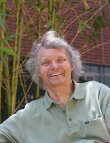Chuck
When I finished my Masters Degree in the nineteen eighties, my supervisor at Hughes Aircraft Company called me into his office and suggested that I apply for a Hughes Aircraft Doctoral Fellowship. It was something I had never considered but with the encouragement of my then mentor … now business partner, Paul … I applied and was accepted to the Fellowship program. One of the first tasks at hand was the selection of a doctoral committee and, in particular, a committee chairman. The choice of a chairman is not one to be taken lightly … it determines the amount of work, the level of frustration (and there will be frustration), and, indeed, the duration of your doctoral program. There are professors who
will not accept a dissertation unless it is a major contribution to the field of study leading to years and years of frustration, sometimes without a degree. Others see graduate students as free labor to advance their own academic careers. A professor on I know once asked me to read a paper by one of his students, It was remarkable work and I told him so. The professor nodded in agreement. It’s really enough for a dissertation, he said, but he’s so good, I’m going to keep him around for another year. Some dominate their students, forcing them to work on subjects related to their own research, while other try to build their academic reputations by being especially hard on their own students. I wanted an ally, not a taskmaster. Paul suggested I talk to the man who’d been his doctoral chair, Dr. Charles L. Weber. Chuck Weber, he called him.
I had taken one course, Detection and Estimation Theory, from Dr. Weber. I’d enjoyed his casual, upbeat teaching style and the ease with which he explained difficult ideas. I knew he was a leader in the field of radar and had seen the books he’d authored on the library shelves. He agreed to be my chair under the condition that Paul (who was on the adjunct faculty) be on my committee, too, because I would be working in the field of sonar.
Dr. Weber wasn’t an easy chairman. He insisted on challenging coursework, including a foray into the math department that left me wondering if I really understood what I already knew. The professors he suggested for my committee were a formidable bunch to face during oral exams. The truth is, because my doctoral work was related to a project I was working on at Hughes Aircraft, Paul provided much of the detailed technical guidance. But I met with Chuck nearly every week for two and a half years, There was always a smile and encouragement waiting for me in his office, even in those times when the work seemed as if it would never lead anywhere. He guided me through and around both administrative and technical obstacles. He never brought an ego to our meetings and he was always the best of mentors. One day, after I’d showed him some new results, he said, OK, that’s enough. You’re done. Start writing it up. Six months later, I had a Ph.D.
Getting my doctorate opened doors for me professionally and eventualy led to my career as a consultant. But it was also taught me a lot about myself. When Walt Kelly’s Pogo used to say, We have met the enemy and he is us, he may have been talking about the pursuit of a doctorate. Without Dr. Charles L. Weber … Chuck … in my corner, I’d never have made it. I haven’t seen Chuck in quite a while but I found out this week that he passed away in August. There will be a memorial service at USC that I will certainly attend. The world not only lost one of its leaders in the field of communication theory, it lost an inspiration and a true gentleman. Rest in Peace, Chuck.
Explore posts in the same categories: feeling older
September 21, 2013 at 11:56 am
I’m glad you had such a quietly powerful ally in your corner. That kind of a relationship and its link to the work that dominates your life for so long must be incomparable.
September 22, 2013 at 7:18 pm
It’s my experience that such people are rare in academia. Am I just being cynical?